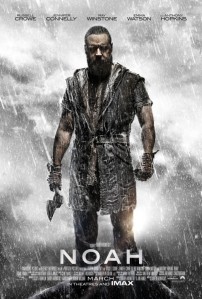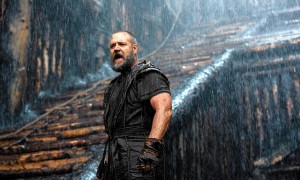(Darren Aronofsky, 2014, USA)
 Biblical films generally follow the letter of their source text pretty closely – think The Ten Commandments or The Passion of the Christ or any of the other myriad ecclesiastical films over the years. The reasons for this should be obvious: the Bible is viewed as a sacred book by two of the world’s major religions, with its stories read as both metaphorical works of morality and actual documentation of human history. Thus, cinematic adaptations of The Holy Book’s innumerable tales come with an inherent obligation to satisfy faithful Christian audiences by not diverging too significantly from The Holy Scriptures; however, these movies must also succeed as modern pieces of art and entertainment, and, as such, are bound to modern notions of narrative, character, and theme. It’s a tricky balancing act to pull off, especially when it comes to some of the more beloved and renowned Biblical tales.
Biblical films generally follow the letter of their source text pretty closely – think The Ten Commandments or The Passion of the Christ or any of the other myriad ecclesiastical films over the years. The reasons for this should be obvious: the Bible is viewed as a sacred book by two of the world’s major religions, with its stories read as both metaphorical works of morality and actual documentation of human history. Thus, cinematic adaptations of The Holy Book’s innumerable tales come with an inherent obligation to satisfy faithful Christian audiences by not diverging too significantly from The Holy Scriptures; however, these movies must also succeed as modern pieces of art and entertainment, and, as such, are bound to modern notions of narrative, character, and theme. It’s a tricky balancing act to pull off, especially when it comes to some of the more beloved and renowned Biblical tales.
One of these hallowed stories comes to cinematic life with Darren Aronofsky’s Noah, a veritable blockbuster based upon the tale of Noah’s Ark found in the Book of Genesis. Make no mistake, though: although adapted from one of the most recognizable narratives in the Old Testament, if not the entire canon of human literature, this is not a religious film on the order of those mentioned above. Aronofsky, who was raised culturally Jewish but now identifies as more generally spiritual, realizes the aforementioned balancing act required to adapt a canonical Biblical story for modern audiences, and takes somewhat of an all-encompassing approach to the material. While following Holy Scripture in detailing some of the finer points of the narrative, the director also embraces science, more specifically biology and ecology, in depicting the broader strokes, resulting in a largely inoffensive, have-it-both-ways work. Due to the potentially volatile nature of any religious subject matter, this was likely the wisest option.
Aronofsky’s Noah, unlike the white-haired, beard-billowing iconic figure of lore, is neither a prophet nor a patriarch, but merely a family man in the hunter-and-gatherer mould (only without the hunting). As played by a shaggy-haired, bearded Russell Crowe, the last descendant of Seth (Adam and Eve’s third child) is something of a vegan environmentalist, preserving the few vestiges of nature, only eating what is necessary, and abstaining from animal meat altogether (where he finds the protein to bulk up his impressively bulging muscles, I’ll never know). Constantly moving his nuclear family unit – made up of wife Naameh (Jennifer Connelly), three young sons, and adopted daughter – around the pre-apocalyptic landscape to avoid the ravaging hordes of Cain’s offspring, Noah is more a nomad than a leader, but when shown visions of an impending deluge, he quickly shifts to hero mode, shaving his head, barking orders, and building an ark. Crowe has made a career out of playing these kinds of historical icons, and his Noah is not too different from his Maximus or Robin Hood – perhaps a little wilder, with a much bushier beard – but it’s still the same manner of intense performance we’ve come to expect from him.
Perhaps the most striking change Aronofsky makes to the sacred source material is the inclusion of the Watchers, fallen angels who were transformed into rock monsters by the Creator (note that the word God is never spoken throughout the film) after they tried to help humanity. Voiced by Frank Langella, Nick Nolte, and others, they resemble prehistoric Transformers more than anything, with their heavenly bodies melted and moulded into jagged stone formations. Ultimately allying with Noah to help build the ark and protect it from the aforementioned ravaging hordes, these creatures will likely prove divisive to general audiences, as they seem too fantastical a conception even for this amazing tale. Though perhaps needed to show how Noah and his small family were able to construct such an immense vessel in a relatively short amount of time, their presence is more off-putting than anything, calling to mind images of the treelike Ents from The Lord of the Rings, or, indeed, any other giant beast from the fantasy canon.
 Still, the film is largely impressive, with the large-scale first hour leading into an ark-set second half that delves deep into the complex psychology of the titular character and his devoted faith. Noah’s constant wrestling with his assigned task and perceived duties is compelling stuff, even if Crowe’s crazed look is a bit too on-point for the material. Less successful is a subplot involving Noah’s middle son Ham (Logan Lerman), who struggles with not having a potential wife to procreate with – the adopted daughter, Ila (Emma Watson), being in love with eldest son Shem (Douglas Booth) – and eventually is corrupted by stowaway Tubal-cain (Ray Winstone), a self-proclaimed king (and last descendant of Cain) who despises Noah for his actions. It’s tragic melodrama of the highest order, yet it doesn’t quite fit with the spiritual themes and end-of-the-world significance of the rest of the piece, coming off as teenage angst and adolescent frustration – a Biblical version of an after-school special.
Still, the film is largely impressive, with the large-scale first hour leading into an ark-set second half that delves deep into the complex psychology of the titular character and his devoted faith. Noah’s constant wrestling with his assigned task and perceived duties is compelling stuff, even if Crowe’s crazed look is a bit too on-point for the material. Less successful is a subplot involving Noah’s middle son Ham (Logan Lerman), who struggles with not having a potential wife to procreate with – the adopted daughter, Ila (Emma Watson), being in love with eldest son Shem (Douglas Booth) – and eventually is corrupted by stowaway Tubal-cain (Ray Winstone), a self-proclaimed king (and last descendant of Cain) who despises Noah for his actions. It’s tragic melodrama of the highest order, yet it doesn’t quite fit with the spiritual themes and end-of-the-world significance of the rest of the piece, coming off as teenage angst and adolescent frustration – a Biblical version of an after-school special.
But it’s a sequence set aboard the ark during this internal second hour that proves to be the most resonant of the entire film, as much for its potential controversy as for its powerful impact. As Noah’s clan gathers around a raging fire, the crashing waves and screaming victims still audible through the wooden walls, the saviour of humanity (such as it is) calms them by telling the story of creation, just as it reads in the Bible. Accompanying his hallowed words, however, is Aronofsky’s vision of such: billions of years of planetary calibration and terrestrial evolution leading up to a startling image of two abnormally glowing figures in the illustrious Garden of Eden. Here, in a stunning montage of a nutshell, is the director’s viewpoint on the ongoing discord between science and religion. It is not that God and knowledge are mutually exclusive, he seems to say, it is that they are one and the same, or possibly two sides of the same coin: merely different ways of viewing, experiencing, and explaining our universe. In this undoubtedly legendary tale of apocalyptic floods and stone golems and 600-year-old men, here is some small nugget of spiritual truth.